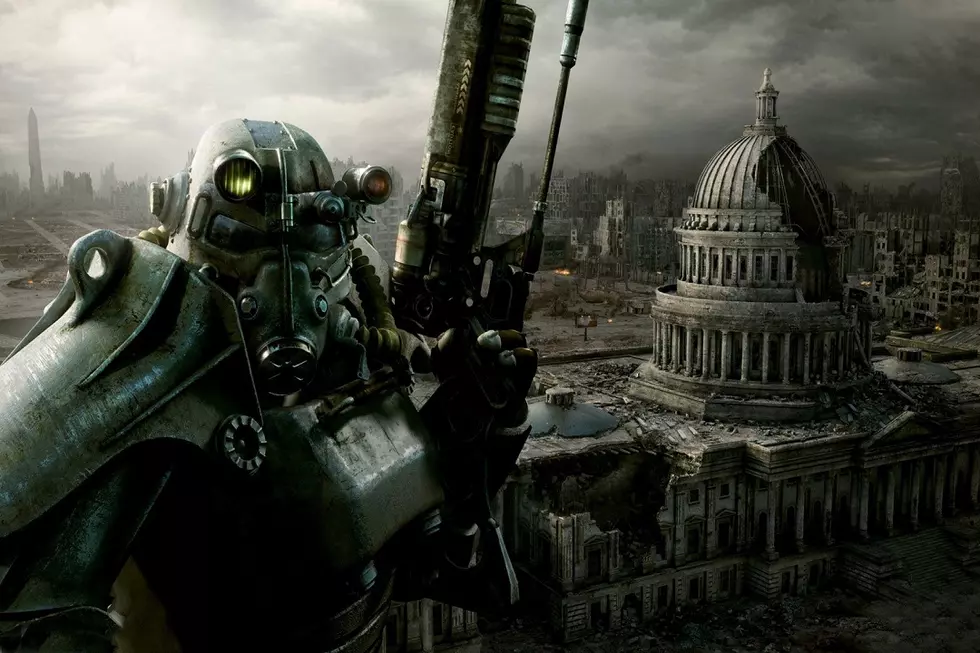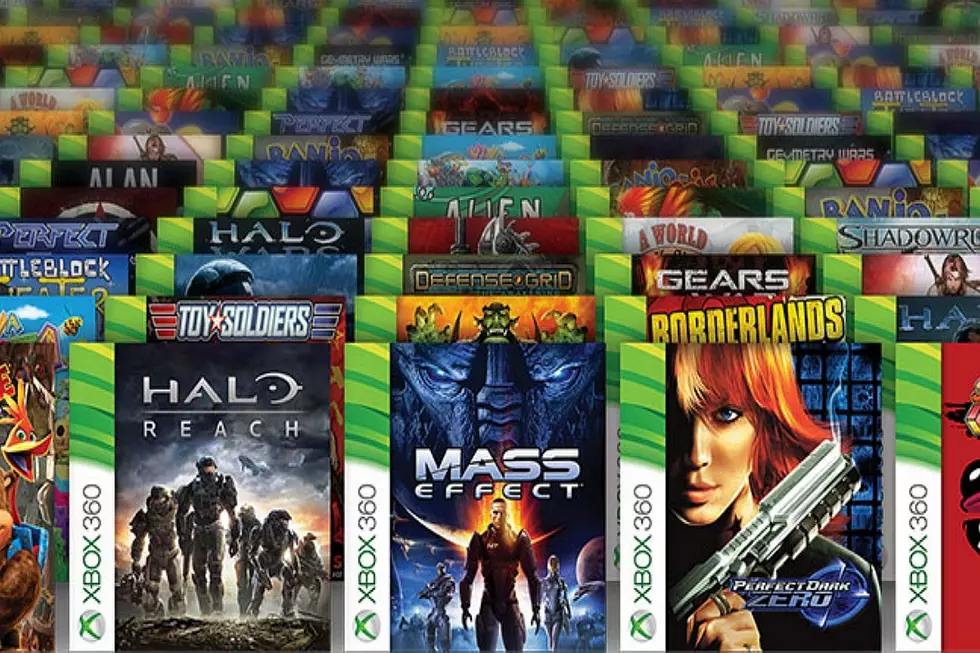
On The Cheap: Fallout 3
2008's Fallout 3 isn't exactly an underrated classic. It was, in fact, a massive success with a huge fan following that garnered multiple Game of the Year awards, and it's still looked on as a high point of the current console generation that laid the blueprint for similar successes that came after. But here's the thing: Fallout 3 isn't just better than the games that came before it, it's still better than the games that came after.
It might not have the deeper mechanics of New Vegas or be as beautiful as Skyrim, but in terms of sheer gameplay, it beats both of those games hands-down, to reign as the all-time champion of the Action-RPG genre. And, you know what? It's under twenty bucks.
The reason that Fallout 3 succeeds where most of its contemporaries fail is story, and to be fair, it's also where it cheats. The main storyline is simple enough that you can boil it down to "Go Find Dad," and even if that wasn't an emotionally loaded standard, they've got the setting to do most of the heavy lifting. Setting the game in Washington, DC was a brilliant move on Bethesda's part just for the sheer amount of iconic images they use. If you're an American, then the imagery of a shattered Washington Monument or the radioactive ruins of the White House are going to evoke a response. It perfectly illustrates the idea of a post-apocalyptic setting in a way that's just as resonant as the wholesale destruction of, say, the Statue of Liberty, but with the added bonus of being something we haven't seen in every summer blockbuster going back to Planet of the Apes.
And they use it perfectly. It's one of the few games that takes full advantage of its premise to give the player an experience that they can't get anywhere else. I have a pretty solid list of favorite moments in video games from the past decade -- shooting beer cans on an overpass with Garrus in Mass Effect 2, racing to the rescue while Bonnie Tyler's "Holding Out For A Hero" blared on the radio in Saints Row The Third, every single other moment of Saints Row The Third -- but nothing even comes close to the emotional connection I had to picking up Abraham Lincoln's rifle and using it to clear a gang of slavers out of the Lincoln Memorial, and that was just a side-quest.
The main story works because the game spends hour after hour showing you what the stakes are, without even making it the focus of the game. You're dumped into a setting that just defaults to being actively hostile while you're trying to accomplish everything else that you have to do, until you're willing to just accept that almost everything in this world can (and wants to) kill you, from animals to people all the way down to the water itself.
From a storytelling standpoint, that's Fallout 3's core mechanic: The idea that drinking water can restore your health, but at the cost of bumping up your Radiation. It's something that you're confronted with all the time as a choice you have to make as a player, and while it doesn't really impact the game itself, it illustrates the point a hell of a lot better than just having those thirsty NPCs who hang out outside the major settlements. When the game finally reveals that the plot revolves around an attempt to purify all the water in the Capital Wasteland, it's something that directly affects your character, something that's understandable both in realistic terms and as something that affects gameplay. And in the end, it even adds to that by making your actions a personal choice, letting you decide whether to purify the water or genetically purify the Wasteland itself, joining up with the Enclave and wiping out a good chunk of the population.
Even beyond that, it feels like your actions matter. Fallout 3 is a game that definitely gives you directions on where to go and what to do in order to advance the plot, but it's also a game that rewards exploration -- literally, in fact, by giving you XP for discovering locations -- and drops you into a world where you can wander in any direction and see what's out there. Even if you do follow the path the game lays out for you, the very first major choice you're given in the game is whether to destroy an entire town. That's a huge deal, eliminating a ton of NPCs and the first "home base" you can acquire and shaping the way your character is perceived, and they trust you with it within the first hour of the game. That's just a small fraction, too. Like Skyrim, Fallout 3 gives you an overwhelming amount of content, but it all feels like it matters. The idea of you, personally, as a player and a character, shaping the fate of the Capital Wasteland is there from the beginning.
By contrast, both New Vegas and Skyrim lack that personal connection. They both try to raise the stakes by dropping you you into the middle of a conflict between two larger forces. You definitely have an impact, but at the same time, it's never really your victory. Skyrim's the worst at this, since the first choice it asks you to make is whether or not you should join up and trust a bunch of people who literally just tried to cut your head off, with the only change being whether you stop on the left side of the road or the right side on your way to Whiterun. I was something like eighty hours into that game before I realized that I had no idea what the plot was and why I should care, and I haven't played it since. It's a pretty game with some neat gameplay stuff going on, but as far as an engaging story, it flops hard. There's no real investment there.
New Vegas isn't quite as bad, but while Fallout 3 presents a world that's constantly teetering on the edge of complete and utter collapse with the Lone Wanderer often being the only thing holding it back, the Mojave Wasteland seems to be doing just fine with or without you. There are settlements, armies, organized governments and other forces all trucking along whether the Courier climbs out of her grave or not. Like Skyrim, the story they're telling requires those things to be there, because it's set against a background of a conflict that requires armies, which in turn require communities and hierarchies that support them. That in itself isn't so bad, but they double down by making your driving motivation -- finding the person who shot you in the head and buried you alive -- only vaguely connected to that larger conflict. Even with Mr. House popping up to complicate things later, the story is about Caesar's Legion and the NCR fighting over the Hoover Dam, and the game doesn't really give you the personal connection you need to really get invested in that story.
Fallout 3 does. Fallout 3 makes you the single most important person in that world, and it should. Also, it has Liberty Prime, and I don't care if you love Skyrim to pieces, there's no way in Hell you can tell me that a giant robot shouting things like, "COMMUNISM IS DEATH!" while throwing around actual nuclear footballs wouldn't have improved that game roughly one thousand percent.
The only real problem with Fallout 3 is the ending, which is kind of abrupt and nonsensical, in that there's no reason at all to screw around with deadly radiation when there's someone completely immune to it just hanging out waiting for you to give him orders. But even that got fixed with the release of the Broken Steel DLC expansion, which also raises the level cap from 20 to 30. The experience of going from low-level play of scrounging for supplies and hoping you can kill something in four shots because that's all the ammo you have, to the high-level play where you're headshotting everything in sight with unique weapons. Or, as I like to call it, "No, F*** you" mode.
And that brings us back to why I'm spotlighting Fallout 3 here in On The Cheap: Right now, you can grab the "Game of the Year" version for around $17. It's got all the DLC, from the downright necessary Broken Steel, to the enjoyably bizarre Point Lookout, to the pretty depressing grind of The Pitt, and the wholly unnecessary but still fun sci-fi weirdness of Mothership Zeta. Fallout 3 has a pretty good claim to being the single best game of the current generation and a strong contender as one of the best of all time, so if you haven't played it, that's the way to go.
More From Arcade Sushi









